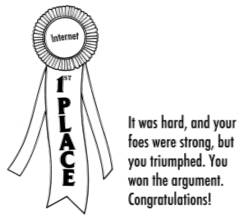




Developing good argument is one of the best and most useful skills someone can use to get his point across, achieve an outcome he desires, or validate his moral position.
Over the years I have listened to many people call into radio talk shows or go before more formal venues such as a city council. Sometimes they will simply argue with their friends or co-workers. Oftentimes, the arguments can tend to lack a depth in terms of facts presented, or the person presenting his thoughts states them more from an emotional basis than from a rational and intellectual one, thus weakening his arguments.
Good argument is not about you and your feelings. It is about the merits of the case that you are presenting. The power of your argument is not dependent upon how long winded you are, and how your marathon speaking exhausts your opponents. It is about how skilled you are with succinctly stating your arguments based upon facts and using the proper degree of emotional charge in the presentation.
When individuals go before the City Council, School Board, or some other political or social entity with an agenda to speak about something they don't like, and their presentation is too emotive, they can often forget that the body they are addressing has to make decisions that transcend the boundaries of individual preferences. One has to remember it is about him plus the other hundreds of thousands or millions who will be impacted by this policy that he wants adopted. (I have to add something about how not everyone plays by these rules and can still bully their argument into legislation)
Good argument is developed from a solid foundation in logic. What is logic? Definitions include the following:
the relationship and interdependence of a series of events, facts, etc..(World English Dictionary); The study of principles of reasoning, especially of the structures of propositions as distinguished from their content and of method and validity in deductive reasoning (American Heritage Science Dictionary). A branch of philosophy and mathematics that deals with the formal principles, methods and criteria of validity of inference, reasoning, and knowledge. Logic is concerned with what is true, and how we can know whether something is true. This involves the formalization of logical arguments and proofs in terms of symbols representing propositions and logical connectives. The meanings of these logical connectives are expressed by a set of rules which are assumed to be self-evident. (The American Heritage® New Dictionary of Cultural Literacy, Third Edition)
How does one get to the point where he is capable of presenting a logical argument with the moral authority that will add power to his words and cause his presentation to rise above all others? I have developed a list of ten points that should assist someone in this endeavor.
1. Know the right amount of emotion to use
2. Remember that it is not just about your story.
3. Make your story about the community.
4. Keep your biases out of your argument if they violate established moral truths
5. Remember that abundance of words is not necessarily equivalent to quality of depth of an argument
6. Remember to care about the people to whom you are arguing or presenting - you want to bring them along with you as allies if you can.
7. Be prepared to stand up for what you are presenting even if it comes at high cost
8. Remember that if you are arguing a just case that the truths that support that argument will still stand whether you win or lose
9. Check to ensure that your inner life is sufficiently congruent to what you are outwardly professing.
10. It is not necessary to be an expert, but know your material sufficiently to be a credit to the argument you are presenting.
Let’s examine these ten points in a bit more detail
1. Know the right amount of emotion to use. Children are born with an innate nature to clamor for what they want and thus must be taught boundaries and self control. It is a critical part of the learning process however to also teach them that it is important to express themselves, as long as that expression is conveyed in a constructive manner. Sometimes that expression is best infused with a degree of emotion that enables the person to get their point across in a way that connects with their audience. Too much emotion can get infused at times and the speaker can come across as unhinged. A certain degree of emotion however can display a sense of connection with the audience and consequently, some investment should be made in that for the outcome of the argument.
2. Remember that it is not just about your story. Unfortunately, many speakers fall into the trap of thinking that their audience cares more about them and their unique background than it actually does. The speaker’s story provides a personal link to the argument he is presenting, but unless he cites additional examples, his case can be seen as shallow and narrow.
3. Make your story about the community. Bringing in other people’s stories, including those who you know, as well as the stories of groups, makes you appear more as someone in the community arguing on behalf of the betterment of the community, and not just your narrow, individualistic self. Citing published examples from recognized authoritative sources can make your argument appear as if it follows established precedents.
4. Keep your biases out of your argument if they violate established moral truths. I have heard many good arguments that are completely demolished in their credibility because the presenter inserted his personal bias into the equation. Many things are right simply because they are right, and emotions and personal views do not make them more correct or less. However, an audience can have difficulty hearing a presenter or reading his presentation if they perceive a bias, particularly one that singles out a particular group.
5. Remember that abundance of words is not necessarily equivalent to quality of depth of an argument. When I was young and given a writing assignment in school I always wanted to impress the teacher and class by writing the longest story or essay. In eighth grade I wrote a 131 page book that mentioned many of my friends and read some of it aloud in my Language Arts class. This tendency for verbosity carried over to the university where sometimes I would attempt to cover up my lack of knowledge about the topic of an essay question by writing reams about the topic. I attend meetings conducted by numerous public entities today that tell all of us that we have to adhere to page limits as it relates to proposals that we present. They may be reading 50 submissions and they don’t want to read 100 pages for each one. There is a way to condense the words down in much briefer form that still allows one to get his point across. US Senators sometimes provide a useful function by standing on the floor of the Senate Chamber and reading names from the telephone book to block a piece of onerous legislation from being enacted. However no one ever remembers what was said. At the same time, memorable sentences can be inserted into just the right point in a presentation to make it memorable for generations to come. An example of this is a speech given by British Prime Minister Winston Churchill on June 18, 1940, right after France had fallen to Nazi Germany. The end of the speech reads like this: “Let us therefore brace ourselves to our duties, and so bear ourselves, that if the British Empire and its Commonwealth[5] last for a thousand years, men will still say, This was their finest hour.”
6. Remember to care about the people to whom you are arguing or presenting - you want to bring them along with you as allies if you can. The easiest thing in the world for people to do when they are arguing a point or trying to win an argument is to adopt an “us versus them” mentality. While that sometimes has to be done in time of war, and in certain other situations, it is not as productive for the long term as trying to win your opponent to your point of view. In that scenario they are not enemies, but allies for your cause. They don’t look on themselves as people who have been bitterly defeated who “shall rise again”, but instead as people who are sharing in the pie that your presentation will enable them to partake. Remember as well that those who oppose you are individuals as you are, who share similar likes and dislikes. If you sincerely desire their well-being, that will come through and add some points to your cause.
7. Be prepared to stand up for what you are presenting even if it comes at high cost. You may have to be willing to see some “friends” go their own way because they will not stand with you in the fight. However you need to remember that you are never alone and your steadiness in holding fast to your argument, even when you can lose much in the process of doing so, can continue to give it a moral authority that will carry you through.
8. Remember that if you are arguing a just case, that the truths that support that argument will still stand whether you win or lose. Individuals are fallible and the correct decision is not always rendered. You have to remember though that you are a winner simply by holding fast to the truth and logical facts of your case. As right as your cause may be, ultimately you may not win the battle. That is disappointing, but you have to dust yourself off, stay committed to your cause, and carry on for there will be another battle on another day. Your opponents who have won this particular battle are going to be watching you to see if cracks develop in your resolve or if you become more wishy washy in your pronouncements and actions. The truth is always the truth and a cause is no less right just because it was voted down today.
9. Check to ensure that your inner life is sufficiently congruent to what you are outwardly professing. One of the biggest attacks that opponents can make against an argument they don’t like is by attacking the personal behavior of the individual making the argument, particularly if there are specific instances they can cite that are not congruent with that individual’s professions. If you profess to believe something, the quality of your inner hidden life must match that to the degree that it can. Sometimes you may do all of that and falsehoods can be stated about you. The fact that allies and observers can see that there is congruence in your life will lend authority to your cause.
10. It is not necessary to be an expert, but know your material sufficiently to be a credit to the argument you are presenting. They may say that 90% of life is just showing up. However, that is not sufficient for giving a presentation where one may encounter a great deal of organized opposition. You need to show up on the battlefield armed not only with the facts, but also with the knowledge of how to use the facts, and to be agile and adaptable during your engagement, to alter your strategy based upon the weaponry utilized by your opponents. Unfortunately it is often not enough to be right. One must also be armed with the ability to sufficiently argue for that right and be agile enough to position that right to decisively capture the opponent’s flag.
If all of this sounds well and fine with you but you don’t feel like you are up to the task, I would state that there are certain things you can do that better equip you in developing a frame of mind that will be able to engage the future. (1) pick a topic in history and read many books and other literature to become a casual expert on it. All of my life I have read many books covering World War II. While I am still not an expert on that war, I am comfortable with following trends in Western history and seeing their applicability today. Having an historical perspective is an asset in developing an argument and having the discipline of staying committed to it, whether it is popular or not. (2) If you are a member of a church, take a spiritual gifts inventory test to see what your gifts are, and focus on your best ones, and don’t worry about your weakest ones. Other tests from the internet or administered through counseling centers determine aptitudes, interests, and abilities. Here again, focus on what you do well. Your strongest method of argument may be public speaking, it may be in presentations to small groups, it may be the keyboard of a computer. You can develop your strengths though and determine the best method for your presentation, and you can be an influence for change.
The Strong Moral Argument
Posted: February 28, 2012 by Chuck DeShazo
